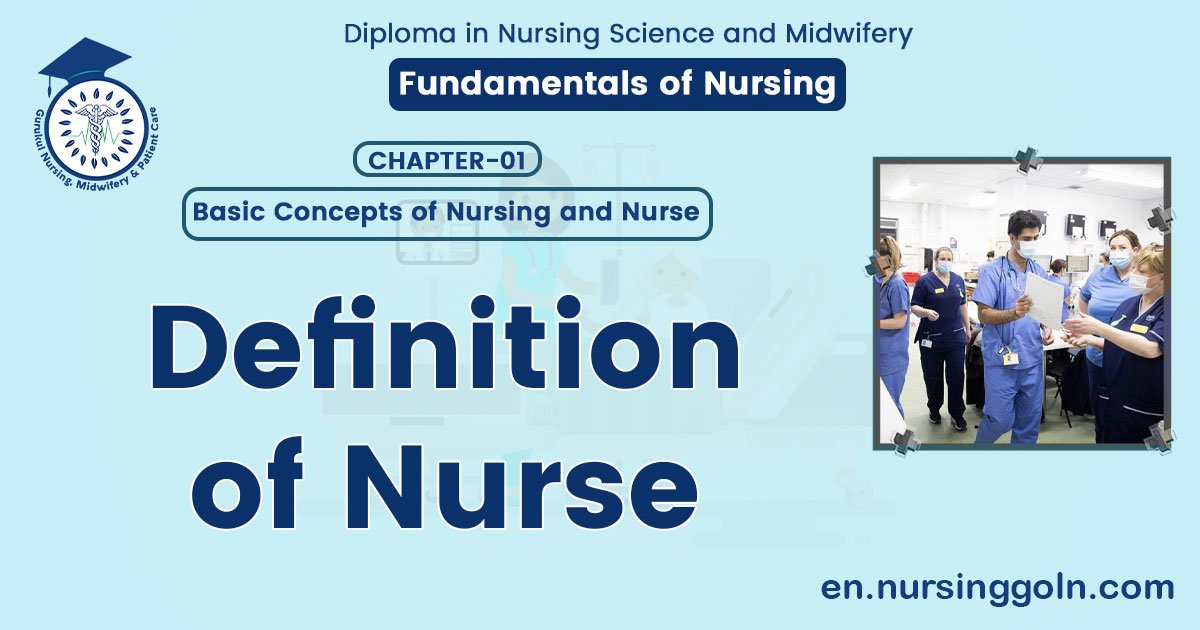Definition of Nurse – The course has included basic concepts of nursing and nursing, the unique functions of a nurse, nursing history, nursing ethics, the BNMC code of conduct, and nurses’ roles and responsibilities. Communication in Nursing: assertive communication, barriers to effective communication, interpersonal and therapeutic relationships, key elements in building relationships, communicating with other health care professionals;
concepts, principles, and practice of first aid and wound care including nursing techniques and procedures, recording and reporting, basic need for nutrition and hydration and elimination for critically ill patients, administering oxygen, medication, and blood products. Health assessment; sources of data and assessment strategies, diagnostic tests, and investigations.
Definition of Nurse
According to the International Council of Nurses (ICN):
“A nurse is a person who has completed a program of basic nursing education and is qualified and authorized in his or her country to provide responsible and competent professional service for the promotion of health, the prevention of illness, the care of the sick, and rehabilitation. nurse is a highly skilled health care professional who combines the art of caring with scientific knowledge and skills developed through their education and career.

Q. Write down the liberal meaning of the word NURSE.
Answer:
Liberal Meaning of the Word NURSE:
N = Nobility, Knowledge.
U = Understanding, Usefulness.
R = Responsibility, Regularity.
S = Sympathy, Simplicity.
E = Empathy, Efficiency.
Q. Write down the objectives of Nursing.
Q. What are the goals of Nursing?
Q. Write down the aim of nursing?
Answer:
Objectives of Nursing:
- To promote health.
- To prevent illness.
- To restore health.
- To facilitate coping with disability or death.
- To help an ill-person to healing
- To assist the dying patient to pass away with quietude, peace, and dignity, (to ease suffering).
- To conserve life.
- To alleviate suffering.
- To give psychological support.
Q. Write down the unique function of a nurse. (DU-Jan 13)
Q. Describe the unique role of a nurse in health care.
Answer:
Unique Function of Nurse:
The unique function of the nurse is to assist the individual, sick or well, in the performance of those activities contributing to health or its recovery that he would performed unaided if he had the necessary strength will or knowledge and to do this in such a way as to help him gain independence as rapidly as possible.
The unique function of a nurse-
- To give skilled bedside nursing care to the patient
- To coordinate the activities of all health personnel regarding patients care
- To conduct field assessment of patients overall situation and
- To be sure patients are referred to the proper place for service.
Q. Explain the different role and competence of nursing.
Q. List the nurse roles and competencies required in health setting, theliom
Q. Write down the role and functions of nurse.
Q. Describe the Nurses roles and competencies required in promoting, maintaining and restoring health. (BNMC-2019)
Answer:
The Nurses’ Roles and Competencies Required in Promoting, Maintaining and Restoring Health:
The nurses’ roles and competencies required in promoting, maintaining and restoring health are –
1. Care giver
2. Teacher
3. Counselor
4. Diagnostic and monitoring role
5. Administering and monitoring treatment regimens
6. Manager
7. Researcher
8. Monitoring and ensuring care quality.
9. Change agent
10. Client advocate
| Nurses Roles | Description |
| 1. Care giver | a) As a caregiver, a nurse provides hands-on care to patients in a variety of settings. b) This includes physical needs, which can range from total care (doing everything for someone) to helping a patient with illness prevention. c) The nurse maintains a patient’s dignity while providing knowledgeable, skilled care. |
| 2. Teacher | a) Educate patient to develop self-care abilities b) Provide knowledge to allow pt. to make informed decisionsc) Demonstrate needed skills d) Promote health, prevent illness, restore health & facilitate coping |
| 3. Counselor | a) Assist and guide patient in solving problems or making decisions b) Utilize the interpersonal (helping) relationship c) Provides emotional, intellectual to and psychological support |
| 4. Diagnostic and monitoring role | This is a critical role that nurses do on a regular basis to identify nursing problems: a) In some groups of patients such as those in critical care settings. DIRE b) In some vulnerable groups such as the elderly or patients with impaired cognitive function, this role is prominent and requires knowledgeable and skillful nurses to early detect serious problems. c) Being assessors, nurses identify problems, causes and risk factors. d) Therefore they are able to alleviate suffering, prevent complications and relapse of their client health problems. |
| 5. Administering and monitoring treatment regimens | Nurses as treatment caretaker- a) Nurses work in collaboration with physicians.b) Physicians’ prescriptions are delivered to the patients by nurses. Such as –
c) Carrying out this role, the client receives full range of treatment regiments. |
| 6. Manager | a) Plans b) Organizes c) Directs d) Controlse) Delegates |
| 7. Researcher | a) Collect data to improve nursing practice b) Provides info for evidenced-based practice c) Studies are done on nursing practice, education & administration d) Provides professionalism to nursing |
| 8. Monitoring and ensuring care quality | a) Nurses are also involved in evaluating and modifying the overall quality of care given to groups of clients. b) Nursing efforts are to monitor and improve patient care services through quality assurance, quality improvement. |
Other Additional Roles of a Nurse:
| Roles | Description |
| 1. Coordinator | a) Coordinates and plans care b) Piece together fragmented care |
| 2. Communicator | a) Establish rapport b) Establish therapeutic (helping) relationship |
| 3. Motivator | a) Motivation- Internal impulse that allows one to take action or change behaviors. b) Nurses motivate patients to make changes by: having a positive attitude, listening to patient needs, encouraging, rewarding, and devoting time and energy to assist with changes. |
| 4. Critical Thinker | a) A way of looking at problems other than the obvious b) “Thinking outside the box” c) Open to new ideas |
| 5. Innovator | a) Takes action to make things happen b) Initiates change c) Sees a problem and looks for solutions. Instead of, “Oh well, there’s nothing that can be done about it” the innovator will be proactive. |
| 6. Leader | a) Have visions to energize others b) Motivates others to achieve goalsc) Encourages others to do their best |
Q. What do you mean by registered nurse?
Q. Who is a registered nurse?
Q. Define registered nurse (RN). (DU-Jan 15, 14)
Answer:
A registered nurse is a graduate trained nurse who has been licensed by a state authority after qualifying for registration.
Or
A registered nurse (RN) is a nurse who has graduated from a nursing program and met the requirements outlined by a country, state, province or similar licensing body in order to obtain a nursing license. An RN’s scope of practice is determined by legislation, and is regulated by a professional body or council.
Q. What are the responsibilities of a registered nurse?
Q. Mention the responsibilities of a registered nurse?
Answer:
Responsibilities of a Registered Nurse:
1. Observing and recording patient behavior
2. Consulting with physicians and other healthcare professionals
3. Establishing treatment plans, operating medical equipment
4. Supervising licensed practical nurses (LPNs) and certified nurse assistants (CNAS)
5. Performing diagnostic tests
6. Treating medical emergencies, such as heart attacks, strokes, car accidents and burns as well as recovering post-operative patients
7. Administering medications and treatments
Q. State the function of a registered nurse which she/he performed in the hospital? (DU-Jan 15, 14)
Answer:
Functions of RN (Registered nurse):
1. Working with a variety of patients, from pediatric to geriatric, or specializing in one of numerous possible areas such as neo-natal intensive care, cardiac care, neurologic care or dermatology
2. Monitor, record, and report symptoms or changes in patients’ conditions.
3. Maintain accurate, detailed reports and records.
4. Record patients’ medical information and vital signs.
5. Order, interpret, and evaluate diagnostic tests to identify and assess patient’s condition.
6. Modify patient treatment plans as indicated by patients’ responses and conditions.
7. Direct or supervise less-skilled nursing or healthcare personnel or supervise a particular unit.
8. Consult and coordinate with healthcare team members to assess, plan, implement, or evaluate patient care plans.
39. Monitor all aspects of patient care, including diet and physical activity.
10. Instruct individuals, families, or other groups on topics such as health education, disease prevention, or childbirth and develop health improvement programs. i to vilaupun
11. Prepare patients for and assist with examinations or treatments.

Profession
Q. Define profession? (DU-Jan 15, 14)
Q. What do you mean by profession?avad
Answer:
Definition of Profession:
A profession is an occupation with moral principles that are devoted to the human and social welfare. Professional nursing is a service devoted to the promotion of the human and social welfare.
or
A profession is a vocation founded upon specialized educational training, the purpose of which is to supply disinterested objective counsel and service to others, for a direct and definite compensation, wholly apart from expectation of other business gain.
or
A profession is the paid occupation which have accreted some special knowledge used by the way either instructing guiding and advising.
Q. Define Professional Nursing?
Answer:
Definition of Professional Nursing:
Professional nursing practice encompasses the full scope of nursing practice and includes all its specialties and consists of application of nursing theory to the development, implementation and evaluation of plans of nursing care, for individuals, families and communities.
Definition of Nursing Profession:
Nursing profession is a profession within the health care sector focused on the care of individuals, families, and communities so they may attain, maintain, or recover optimal health and quality of life.
Q. Why nursing as a profession? (DU-Jan 16, 15)
Q. Write down the criteria of nursing profession?
Q. Why nursing is called as a profession?
Answer:
Nursing as a Profession:
- Based on social and scientific principle have it owns body of knowledge ob indW.
- Have a strong scientific base (academic and theoretical)
- Have a strong service orientation in response to the social need of human and social welfare.
- Have a code of ethics bato
- Have a professional organization to that sets standards a alguien nosor σκλίου
- Conduct ongoing research to enhance the body of knowledge and to improve service to society.
- Have autonomy (self-governance)
Q. Write down the characteristics of nursing as a profession? (DU-Jan 14)
Q. Mention the characteristics of nursing profession?
Q. What are the essential features of professional nursing?
Answer:
Characteristics of Professional Nursing:
1. Assessment, diagnosis, planning, intervention and evaluation of human responses to health and illness.
2. The provision of direct nursing care to individuals to restore optimum functional or to achieve dignified death. bingotlin
3. The procurement, coordination and management of essential client resources.
4. The provision of health counseling and education.
5. The establishment of standards of practice for nursing care in all settings, induce the development of nursing policies, procedures and protocols for a specific nursing. 6. The direction of nursing practice, including delegation to those practicing technical nursing.
7. The supervision of those who assists, in the practice of nursing
8. Collaboration with other independently licensed health care professionals, in case finding and clinical management and execution of intervention as identified to be appropriate in a plan of care.
9. The administration of medication and treatments are prescribed by those professional arbato qualified to prescribe under the provision existed acts.
Q. What are the essential components of professional nursing?
Q. Write down the components of professional nursing?
Answer:
Components of Professional Nursing:
1. Care: It is providing comfort and support in times of anxiety, loneliness and helplessness. It is listening, evaluating and intervening appropriately.
2. Cure: The promotion of health and healing is the cure aspect of professional nursing. It is assisting clients to understand that health problems and helping them cope. It is the abens administration of medications and treatments.cup mistros avad tum sem inno
3. Co-ordination: Co-ordination is sharing responsibility for the health and welfare of all people in the community and it is participating in programmes designed to prevent illness and maintain health.de
Q. Write down the professional obligations of the nursing.
Q. What are the professional obligations of the nursing?
Answer:
Professional Obligations of the Nursing:
- Acceptance of accountability which is demonstrated by quality assurance.
- Development of complete by improving knowledge, skills and attitude on the contemporary scientific knowledge that are applied to nursing practice.
- Identifying problems and utilizing its outcomes to improve the quality
- Nursing education and service and incorporation new ideas in practice for the achievement of common health goals.
- Performing according to the professional code of ethics and contributing to the development of the science and practice of nursing by participating in the activities of the professional organization.
- Collaborating and coordinating with other health care disciplines to improve health care.
Q. Define professional nurse? (BNMC-2023)
Q. Who is a professional nurse?
Answer:
Definition of Professional Nurse:
The professional nurse is the nurse who has received the maximum amount of education or training offered by recognized and accredited schools of nursing and who strives to promote the physical, mental and spiritual welfare of members of society with whom she comes in conduct.
Q. What are the qualifications of a good nurse?
Q. Describe the common qualities of a good nurse.
Q. Write down the qualities a good nurse? (BNMC-2023. 2022/DU-July 14)
Q. What are the qualities and characteristics of professional nurse?
Answer:
Qualities and Characteristics of a Good/Professional Nurse:
The professional nurse must have certain qualities and characteristics, in order to be considered a good professional. These are:
1. Nurse must be mature physically and emotionally (good physical and mental health).
2. Nurse must have an up to date knowledge.
3. Nurse must keep herself clean, tidy and well groomed
4. Nurse must be dependably clever, gentle, sympathetic, cheerful alert, tactful kind and honest.
5. Nurse must inspire confidence in others and in herself
6. Nurse must be intelligence
7. Nurse must be open minded, cooperative, responsible and able to develop good interpersonal relations.
8. Nurse must be a good leader.
9. Nurse must have positive attitude towards caring.
10. Nurse must be truthful efficient in technical competence
11. Nurse should be responsible of family society and not particularly devoted to the patients
12. Nurse should have self-belief towards human care and cure.
13. Nurse should convey cooperative attitude towards co-workers. In turn they will develop greater respect for the nurse, who is courteous and considerate
Q. Write down the role and responsibilities of student nurse.
Answer:
Role and Responsibilities of Student Nurse:
Nursing student nurses are held to the same standards of care as are registered nurses. Nurses must be familiar not only with their state’s standards of practice, but also with the policies and procedures in which they have their clinical experiences. Their instructor is responsible for making assignments that are within their competence and for providing clinical supervision. However, this does not excuse from own legal responsibilities.
- Prepare carefully for each clinical experience.
- Never attempt a procedure or make a judgment about which we feel unsure. If we lack the theoretical or practical knowledge for an assignment, notify our clinical instructor immediately.
- Notify our instructor or a stuff nurse if our patient’s condition changes significantly.
Ethical and legal issues are a major source of conflict for nursing practice. It is important to be clear in our mind that “legal” and “ethical” are not always the same things.

